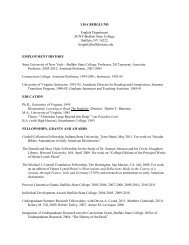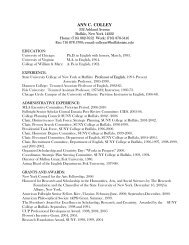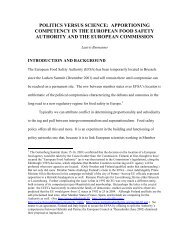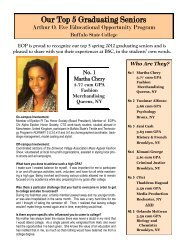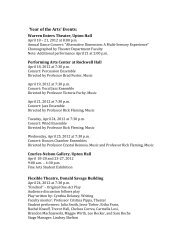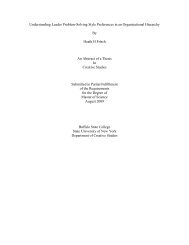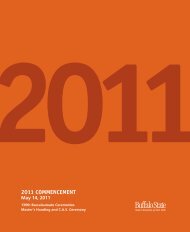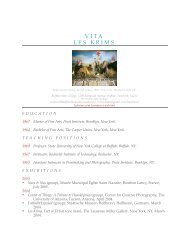Arts - Buffalo State College
Arts - Buffalo State College
Arts - Buffalo State College
You also want an ePaper? Increase the reach of your titles
YUMPU automatically turns print PDFs into web optimized ePapers that Google loves.
66<br />
Education<br />
Fifth Grade Moon Phasing: Curriculum<br />
Mapping<br />
James Zacher II, EDU 690: Master’s Curriculum and Assessment<br />
Project<br />
Faculty Mentor: Professor Coralee Smith, Elementary Education<br />
and Reading<br />
I’ve taught fifth grade for four years, and the one concept<br />
over the years that was the most difficult to teach due to the many<br />
misconceptions, is the moon. This interactive, web-based curriculum<br />
project focuses on effective teaching methods to teach about the<br />
moon. A curriculum map has been laid out based on research that<br />
identifies misconceptions on the Moon, or diagnosing the gray area,<br />
and coming up with a cure in the form of lesson plans that research<br />
has found, use effective strategies that will eradicate students’<br />
misconceptions. This unit on the Moon will correlate with standards<br />
and use effective assessment to drive the instruction. The pretest<br />
will identify students’ preconceptions or misconceptions, and help<br />
identify what concepts about the Moon have to be focused on more<br />
than others. The unit will last about two weeks, covering ten lessons<br />
that will include formative assessments to help drive instruction,<br />
while adapting it at the same time. It will conclude with a summative<br />
assessment used as data to identify whether students meet the<br />
standard by getting rid of their misconceptions about the moon.<br />
Students will identify the moon and its movement and relationship<br />
to other celestial bodies, such as the Earth and Sun. Students will<br />
identify what moon phases are, and more importantly what causes<br />
them. Finally, students will identify that the moon has gravity and<br />
the impact is has on Earth’s tides. The web site address is www.<br />
fifthgrademoonphasing.wordpress.com.<br />
Presentation Type and Session: Poster IV<br />
Grade Five Mathematics: Interactive Web-<br />
Based Curriculum<br />
Kelly Wrzochul, EDU 690: Master’s Curriculum and Assessment<br />
Project<br />
Faculty Mentor: Professor Coralee Smith, Elementary Education<br />
and Reading<br />
The purpose of this elementary education curriculum project<br />
was to create a user-friendly, web-based teaching unit that focused<br />
on creative ways to teach fractions to elementary students, as well as<br />
to provide elementary teachers with instantaneous access to multiple<br />
mathematical teaching resources. This project integrated curriculum<br />
and web technology into a functional website that is easily accessible<br />
for teachers, students, parents and community members. The<br />
curriculum project was created using the Mathematics Common<br />
Core Standards and the National Council of Teachers of Mathematics<br />
Standards for elementary students. This interactive web site contains<br />
specific sections concerning the use of mathematical manipulatives,<br />
teaching and learning about fractions with manipulatives, the<br />
importance of using problem-based mathematics, a curriculum<br />
map to guide instruction and lessons with formative and summative<br />
lessons. The curriculum project site focuses on grade 5 mathematics,<br />
and in particular, the topic of fractions with manipulatives. The web<br />
site can be accessed at wrzochulmathematics.wordpress.com.<br />
Presentation Type and Session: Poster III<br />
An Inch and a Hop Into Life: Life Cycles<br />
Emily Thiesen, EDU 690: Master’s Curriculum and Assessment<br />
Project<br />
Faculty Mentor: Professor Coralee Smith, Elementary Education<br />
and Reading<br />
Science is a content area within education and many schools<br />
that has slowly drifted into the background of curriculum. Reading<br />
and mathematics have been on the forefront of instruction. If science<br />
is taught, it usually is through strategies and techniques that have<br />
worked in the past. Educators are afraid to take risks. My project<br />
is based on the life cycles of butterflies and frogs in the first grade.<br />
I developed a three-week unit study on the life cycle of these two<br />
organisms utilizing inquiry based and hands on learning. My goal<br />
is to inform and instruct without having to rely on the traditional<br />
textbook approach. Research has proven that inquiry based learning<br />
and hands on materials benefits students. Early exploratory learning<br />
creates positive attitudes toward science and leads to a better<br />
understanding of scientific concepts studied in later grades. Science<br />
is meant to be explored and fun. My curriculum project is a website<br />
for future educators, parents and students to use. The web site<br />
address is www.msthiesensclassroom.wordpress.com.<br />
Presentation Type and Session: Poster IV<br />
Inclusion of Students With Intellectual<br />
Disabilities In a Post-Secondary Setting<br />
Shanice Johnson, EXE 364: Educating Students with Severe<br />
Disabilities<br />
Faculty Mentor: Professor Lynne Sommerstein, Exceptional<br />
Education<br />
This poster session will show how an inclusive college setting<br />
helps increase the reading skills of a student with significant<br />
disabilities from the <strong>Buffalo</strong> Public Schools. Through the <strong>College</strong>-<br />
Based Transition Program, an inclusive non-credit program of<br />
<strong>Buffalo</strong> <strong>State</strong> <strong>College</strong> and the <strong>Buffalo</strong> Public Schools, students not<br />
typically served by colleges learn how to live, learn, and increase<br />
socialization skills through peer and instructional support. The<br />
subject of this single-subject research is a 19-year old male<br />
student with intellectual disabilities and traumatic brain injury<br />
who participated in EXE 364, Educating Students with Significant<br />
Disabilities. This study shows how this student entered this class<br />
as a non-reader and accomplished his Individualized Education<br />
Program goal in reading by demonstrating a year’s worth of<br />
improvement in reading in one semester. The rationale and results of<br />
pre-post ecological assessments will be presented as well as supports<br />
and instructional strategies used to accomplish results. Topics for<br />
further study will be explored.<br />
Presentation Type and Session: Poster II




